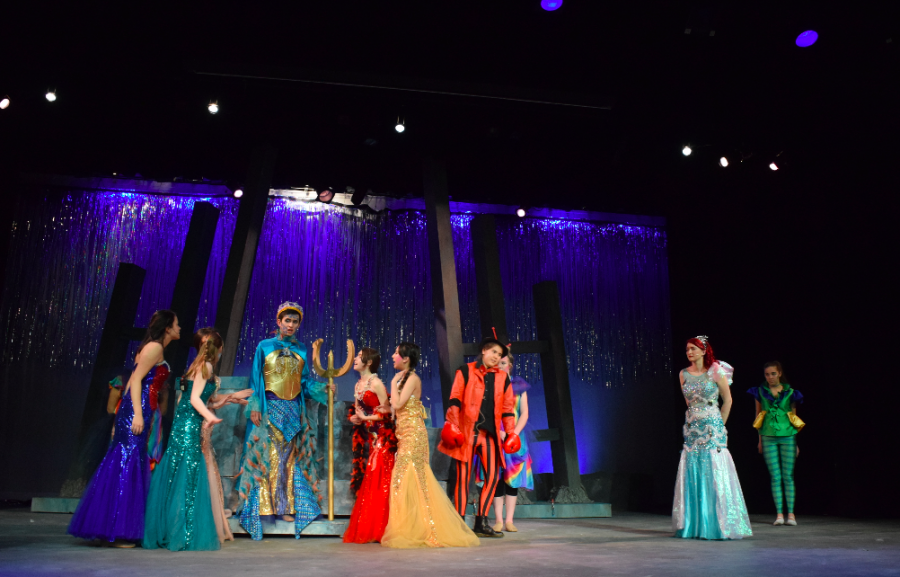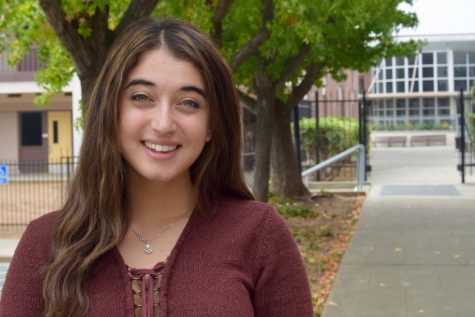The actors and actresses stand in a circle outside the MVHS auditorium, crossing their arms to hold hands with their neighbors. One person presses their thumb into the hand of the person next to them as this form of assurance is sent around the circle, easing the nerves of the cast. Several members have colored hair, another has claws for hands. The designers and managers alike take their positions off-stage while the directors gather attention of the cast.
But the actors and actresses aren’t the only ones in the spotlight. Just below the stage are violinists, flutists and other musicians tuning their instruments as music director Ricky Alegria holds up his baton, waiting for his cues from on stage.
Unlike a typical drama production, this year’s production of “The Little Mermaid” is a musical, involving not only the drama department, but also MVHS’ instrumental music departments.
These types of musical extravaganzas didn’t always happen at MVHS.
The former drama teacher Holly Cornelison never put on musicals at MVHS. Since the 80s, people had began losing interest in the drama department and it had started losing funding.
MVHS alumni Nick Rafello explains that when he attended MVHS in the late 1970’s, drama and theater arts were influential parts of the lives of students.
stressed the importance of these organizations, especially during the winter season when choir groups, including his own, called “The
During his time, MVHS had about 300 students involved in the music and drama departments, in addition to several choirs and groups. Rafello
” would even skip class to rehearse their holiday repertoire.Magicals
But singing and acting didn’t always seem like the expected path for Rafello. During his sophomore year, he found himself struggling in school due to stress at home. After being summoned by his counselor who insisted on him joining theater arts, Rafello took up singing and acting. And soon, he found his grades rising from a D average to a B plus.
Rafello then knew the impact of theater on him. Being a part of something that was recognized and respected motivated him to do well and excel, even if it didn’t mean that he was going to be an Academy award-winner.
“We were all very well-respected because we were good,” Rafello said. “We had very raw talent. It doesn’t mean you’re going to be the best actor, actress, singer [or] dancer, [but] at least you have a respect and understanding.”
Although he doesn’t think acting is for everyone, Rafello believes that the theater industry is less prominent than it was during his time in high school as others subjects are more valued today.
But with time, the musical aspect of MVHS drama faded away. According to Rafello, the demand for math teachers grew, and the number of students involved in drama and music departments declined.
However, this wasn’t the end for musicals at MVHS. Three years ago drama teacher Sara Capule decided to restart musicals as a way to expose her students to what she believes is a different type of drama.
“[Musicals] enable my drama students to experience both straight plays and musicals which address different things,” Capule said. “So I like that it gives them opportunities to grow as actors in different ways.”
She also believes that audiences are more likely to enjoy a musical and that it brings something different to the drama department.
Senior Michael Burgess, who plays King Triton in “The Little Mermaid,” believes that musicals are unique as they give other students who aren’t in the drama class the opportunity to participate in a drama production.
Beginning in January, Alegria and Capule rehearsed separately with their casts and ensembles, and about a month before the performances, the two groups began rehearsing together. Practices allow for adjustments with scoring, cues and choreography as there is action both on and off the stage with the pit orchestra.
And despite the percieved disregard for theater arts compared to 30 years ago, Capule hopes to continue musicals to extend the interdisciplinary legacy of musicals at MVHS, and provide students with a slew of opportunities as actors, dancers and musicians.
“The reality is, it’s important for all of us, especially now in today’s world,” Rafello said. “We’re all mingled together, in all shapes and sizes, ethnics and religions, and it’s exciting, it’s fun, you learn from each other and that’s what makes a great theater.”







